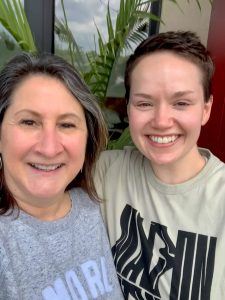They. Them.
Those familiar pronouns have been part of my vocabulary for many years. And for almost all those years, these words have been plural pronouns. “They” and “them” were generalized words used to lump a group of people together and, in many cases, promoted anonymity within the group.
But the role of these pronouns has changed, and that change is important for all of us. “They” and “them” are now the singular pronoun for some people who identify as gender-neutral or nonbinary.
This change may not seem like a big deal because once we have mastered diagramming a sentence (Do kids still learn that?), we tend to forget about the various parts of speech and use these variations without any real thought.
She. Her. Hers. Those are my pronouns—they’re how people have referred to me my entire life. And for most of my life, I didn’t really think about them. Almost everyone I’ve met in my life has correctly assumed my gender, using the pronouns that feel right to me.
For those of us who have been called by our correct pronouns from birth, it may seem hard to understand how significant gender identity is and why pronouns are so important.
But the use of correct pronouns matters.
Using a person’s correct pronoun shows respect for his/her/their identity. On the other hand, intentionally not using a person’s pronouns or using the wrong ones is an act of oppression and bullying. A study at the University of Texas Austin found that the use of a person’s chosen name reduces depression and suicide risks for transgender youth; pronouns are shorthand names, so they matter just as much.
But relearning and correctly using pronouns is not as easy as it may seem. There’s that old saying: “You can’t teach an old dog new tricks.” I think old dogs are capable of a lot more than we give them credit for, but I have found that sadly this change has been a challenge for me.
Let me be perfectly clear, it is my intent to always use a person’s pronouns, but I’m not always perfect. Fortunately, I have people who I love who are helping me do better.
Anna Selle is one person like that. I’ve known Anna since they were in middle school. They’re my daughter’s age and were in our church’s youth orchestra together where the two became fast friends. This year, Anna came out as nonbinary. Anna’s pronouns are they and them.
Making the change when speaking about someone I have previously referred to differently isn’t automatic, so I often misspeak. When that happens, I offer a quick apology and correct my statement using the preferred pronoun.
 I talked to Anna about the things I can do to make their life a little bit easier. As a cis, straight woman, I’ll never be able to fully understand Anna’s experiences, but I can do everything in my power to make their life better, happier, and more accepted.
I talked to Anna about the things I can do to make their life a little bit easier. As a cis, straight woman, I’ll never be able to fully understand Anna’s experiences, but I can do everything in my power to make their life better, happier, and more accepted.
We recently spent the afternoon talking about the things someone like me can do to be supportive. Anna was so generous their time and patient with my questions. During our conversation, they offered these tips for how to give your support:
- When someone comes out to you, simply listen to them and say, “ok, great” or “I hear you.” Be affirming—appreciate that they shared with you.
- They don’t need you to analyze or question what they are saying, simply hear them and offer support. Simply “I love you just the same,” “You seem so happy,” or “I am so happy for you” is more than enough.
- If it’s early on, ask “are you comfortable with me sharing this, and if so, with whom?” No matter what their response, respect it.
- Be cautious as you use a person’s pronouns until you know who knows. Using the preferred pronouns can accidently out someone if they haven’t shared their identity with everyone in the conversation.
- Assure them you are a safe person and place for them. Let them know they can share anything with you and you will be there for them no matter what. And then make sure you are intentional in your actions and acceptance.
- For people you have a closer relationship with, asking “What can I do to be the best ally for you?” opens the conversation for them to express what would be really helpful. Listen carefully to their answer and take it at face value.
These are obviously first steps, and I actually hope you already knew all of this. But no matter where we are now, there is so much more each of us can do to be a great ally for people we know and also those who are part of our greater community.
While I was fortunate to have an amazing friend who understood that my lack of knowledge was simply that and was willing to overlook the awkwardness of some of my questions, not everyone is so fortunate.
So where can we go to learn more? How can we develop a greater understanding of the challenges and celebrations experienced by the LGBTQ+ community?
Where you start depends a bit on where you are now.
Watching a show like Schitt’s Creek—even though it’s fiction—acquaints us with terminology and allows us to see a setting where there is absolute acceptance and understanding.
On that note, consume media written by openly queer people. Follow social media accounts and writers who identify differently than you do. Go to Pride events that are open to the public and listen to speakers. Google correct language and terminology.
No matter where you are, you can learn more. No matter what you are currently doing, you can do more. Take a first step or continue the long journey you are already on to greater awareness and acceptance.
And remember, a person is not defined by their pronouns—they are simply one way to describe them.
















